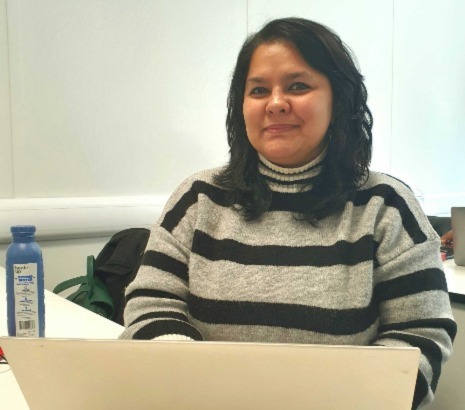What type of applicant are you?
MA Journalism & Media Communications
Why choose Herts?
- Research: Benefit from advanced research study led by our expert research-active teaching staff
- Employment prospects: Graduates have gone onto work in a variety of media roles such as Press Officers, Social Media Analysts, and Journalists for organisations including BBC, Mail Online, Subway and Euromonitor.
- Teaching excellence: Learn from our industry-experts, award-winning lecturers who are experienced in print, web design, journalism, and PR (see key staff section).

Alumni Stories
April Wilson
Meet April Wilson, who used the diversity of her course to gain new experiences and learn. She is currently an Alumni Relations Coordinator at the University of Sussex.
| Current job role | Alumni Relations Coordinator |
|---|---|
| Year of graduation | 2017 |
| Course of study | BA(Hons) English Literature with Film |
| MA Journalism with Media Communications |
University life and experience
April initially decided to go to the University of Hertfordshire due to our close proximity to London. She liked that it was easy to commute into the city for shopping and concerts, but that Hatfield wasn’t as expensive to live in!
While studying, April gained valuable experience which helped her develop essential skills for her current role which meant she was able to start ‘armed with the knowledge’ she needed.
However, the most useful thing she learnt from her postgraduate course was having confidence in herself and her ideas, especially when presenting. She credits this to ‘the support of my peers and lecturers who made me feel more confident in my abilities.'
She adds that her undergraduate degree helped her develop the writing and research skills which she applies daily to her current role and her approach to work.
Not only did April gain experience from her studies, but the extra-curricular activities she took part in also helped develop her skills. She says, ‘The writing and video editing experience I was able to gain from my time volunteering for societies at the University was also essential in helping me to have the skills that are valuable within my role.’
Future aspirations
April is also willing to try new experiences to help her gain valuable work experience in a variety of roles. She has previously, done everything from fundraising for charity to running my own online magazine.
In the future, April hopes to continues her studies and complete a PhD in Film Studies. She is particularly interested in looking at representation in films and how this is interpreted through social media.
Professional Accreditations
This course is partnered with the Public Relations and Communications Association (PRCA), giving you access to networking and tailored speaker sessions, as well accreditation upon graduation. The University is also an Academic Member of the British Society of Magazine Editors which provides expert speakers and information on the latest trends in this area

About the course
Our MA Journalism & Media Communications is a full-time taught programme with a great record of helping students achieve jobs in the industry. By joining this programme, you’ll extend your knowledge and skills in the media. You’ll meet students from around the world, forming close friendships and strengthening your international awareness.
You’ll benefit from our extensive links with the media industry including, membership of the Public Relations and Communications Association and educational membership of the British Society for Magazine Editors. Be inspired by our guest speakers. Previous talks have welcomed journalists from Sky News, the editor of Marie Claire, an investigative journalist from the BBC and head of a media agency. Plus, we’ll invite you to join our small ‘afternoon tea’ sessions with speakers twice a semester. You’ll be supported to find valuable work experience. Previous students have gained placements with the BBC, Sunday Times and a variety of PR agencies.
You’ll analyse contemporary intellectual theories of media and communications. You’ll cross-examine the synergies between social media, PR and journalism, interrogate current media practices and convergence. Every step of the way, there’ll be a strong focus on your future employability. You’ll be taught by lecturers with extensive professional experience of journalism, PR, web design, media production and media research. Whatever your background, this MA will enhance your career by equipping you to operate effectively in a professional media environment.
By joining this MA programme, you’ll benefit from a diverse and international student cohort within the School of Creative Arts postgraduate community.
Pathway Options
- MA Journalism & Media and Communications - one year
- MA Journalism and Media Communications (Sandwich) - two year [not available to semester B entry]
- MA Journalism and Media Communications (with Advanced Research) - two year
Whichever pathway you choose, you’ll gain valuable skills in practice and a theoretical understanding of journalism, media and communications management. Our programme is flexible. Students normally choose their pathway when they apply but there is some flexibility to change in the first semester and you can also swap from the two-year to one-year programme in the second semester.
Why choose this course?
- You want to gain a broad range of communication and digital media skills.
- You want to feel inspired by expert lecturers widely experienced in the communications industry plus as a partner university with the prestigious Public Relations and Communications Association (PRCA).
- You’re excited to gain valuable networking skills and contacts.
- You’ll benefit from the experience of our expert speakers and gain current knowledge of the PR industry.
- You want to gain insights into emerging trends in the fast-changing digital media world. You want your skills to be valued by a wide range of media and related industries.
What will I study?
You’ll have weekly two-to-four-hour workshops for each module. Plus, there can be online activities too. You’ll be supported by regular one-to-one supervision by academics from the University’s Media Group.
On the one-year programme, you will study a range of modules covering journalism, corporate communications and media production.
Modules include Corporate Communication, PR and Advertising; Writing for Magazines; Sports Journalism; and Media Production as well as modules on research methodology. You’ll have a range of options for your final project.
For Media Production you’ll create multimedia – podcasts, designs and promotional strategies – for online magazines. You’ll pitch and measure a campaign and use social media to promote your work. Writing for Magazines will give you the practical skills to write articles for online and print audiences. You’ll produce webinars on the business model of magazines. Plus, you’ll learn how social media and blogging are enhancing the magazine experience.
Our module Sports Journalism will give you a key understanding in the exciting practices of sports journalism, from interviewing top stars to reporting on breaking sports stories. You’ll also create news bulletins and write news features.
Two modules on research methods and critical and theoretical debates will equip you with advanced research skills and transferable communications skills. These include interviewing, identifying a story and building connections; vital skills for PR and corporate communication roles.
Key staff
Dr Genevieve Bosah
Find out more about Dr Genevieve Bosah
Further course information
| Course fact sheets | |
|---|---|
| MA Journalism and Media Communications | Download |
| Programme specifications | |
|---|---|
| MA Journalism and Media Communications | Download |
| Additional information | |
|---|---|
Sandwich placement or study abroad year |
n/a |
Applications open to international and EU students |
Yes |

